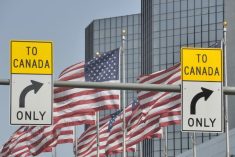Ottawa | Reuters — Canada will not extend existing broad-based COVID-19 support programs for companies and individuals when they expire on Saturday because the economy is recovering well, Finance Minister Chrystia Freeland said on Thursday.
Instead, Ottawa will introduce more targeted and less costly measures for hard-hit sectors such as the tourism industry.
The new programs will cost a total of $7.4 billion between Oct. 24 and May 7, 2022, compared with the $289 billion Canada has already spent, Freeland said.
“Our economy is rebounding, and we are winning the fight against COVID,” she told reporters.
Read Also

U.S. grains: Soy futures post biggest monthly gain in nearly five years on China trade optimism
U.S. soybean futures climbed to a 15-month high and posted their biggest monthly gain in nearly five years on Friday following a rally fueled by the prospect of revived exports to China.
Ottawa will aid hotels, restaurants and travel agencies still facing public health restrictions. It will also help cover the rent costs of employers who can show they have faced deep, enduring losses.
A third program is for companies that might suffer in case there are more lockdowns.
Prime Minister Justin Trudeau’s minority Liberal government spent heavily to tackle the pandemic, sending the national debt and budget deficits to record highs.
“Today our support needs to be more narrow, more targeted and less expensive,” said Freeland.
The left-leaning opposition New Democrats, whose support the Liberals will need to govern, said Trudeau was acting hastily.
“The COVID-19 pandemic is not over… This is clearly not the time to cut help for families and small businesses,” leader Jagmeet Singh said in a statement.
Separately, officials said Ottawa and the 10 provinces had agreed on a standard COVID-19 electronic vaccination passport allowing domestic and foreign travel.
The deal prevents possible confusion that could be caused if the provinces — which have primary responsibility for healthcare — all issued their own certificates.
The National Airlines Council of Canada, which represents major carriers, welcomed the move but said Ottawa should take other measures to boost travel such as scrapping pre-departure testing for fully vaccinated people coming to Canada.
— Reporting for Reuters by David Ljunggren in Ottawa; additional reporting by Julie Gordon.












